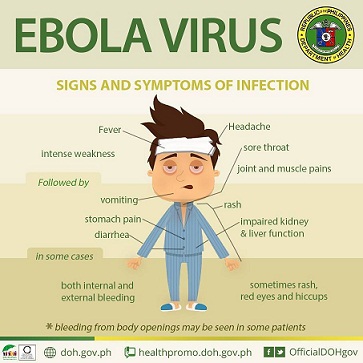
Warning: There’s a hoax screenshot of my article in Yahoo on Ebola virus which says “Ebola virus has killed 23 people in Manila”.
This is not true. It’s a hoax.
There is no report of death due to Ebola virus in the Philippines.
This is the legitimate link to my Yahoo article: https://ph.news.yahoo.com/good-hygiene-weapon-vs-ebola-174551384.html. It’s based on the interview with Dr. Tony Leachon, president of the Philippine College of Physicians and information director of the University of the Philippines, Manila; on what we should do against the deadly Ebola virus that is wreaking havoc in West Africa.
The Department of Foreign Affairs has advised Filipinos in West Africa “to restrict non-essential movements, avoid public places and to take extra precaution.”
The World Health Organization said as of August 1, 2014, the cumulative number of Ebola virus attributed cases in Guinea,Liberia, Nigeria and Sierra Leone stands at 1, 603 including 887 deaths.
The DFA said there are 880 Filipinos in Guinea; 1,979 in Sierra Leone; 632 in Liberia including 148 members of the United Nations Peacekeeping Force. There are 7,282 Filipinos Nigeria, according to the Commission on Overseas Filipinos.
Globalization has broken down geographical barriers. The upside is easier movement of people and goods. OFWs, more than two million of them all over the world, is a showcase of globalization.
The downside of that is the easy spread of diseases such as the one caused by the deadly Ebola virus.
The Department of Health said they are coordinating with the airport officials on measures to prevent the Ebola virus from reaching the Philippines.
Dr. Tony Leachon, president of the Philippine College of Physicians and information officer of the University of the Philippines, Manila, said: “The DOH should work with NAIA (the Ninoy Aquino International Airport) and all international airports and the Bureau of Immigration to train their personnel to identify passengers with travels to Africa, impose quarantine till a passenger has been cleared, and set up preventive measures including producing info graphics and brochures on the Ebola virus.”
“The key is to secure all portals of entry,” he said.
There is no cure for Ebola disease. Incubation period for Ebola ranges from two days to 21 days. That means, someone infected with it can be carrying it up to three weeks without knowing it.
The deadly Ebola virus is transmitted to people from wild animals and spreads in the human population through human-to-human transmission.
The first outbreak of Ebola disease was in 1976 in Yambuku, Zaire (now Congo) along the Ebola River (thus the name of the virus) and the identified source were bats.
Leachon said “The virus is not airborne, which means those in close contact can be infected and are most at risk. A person sitting next to an infected person, even if they are contagious, is not extremely likely to be infected.
‘Health workers and caregivers of the sick are particularly at risk for the disease because they work in close contact with infected patients during the final stages of the disease when the virus can cause internal and external bleeding.”
Leachon took note that “In this outbreak alone, more than 100 health workers have been infected and at least 50 of them have died, according to the WHO.”
He urged those who suspect they have been infected with Ebola “to go to the isolation and treatment centers if they experience the earliest symptoms of the disease, to increase their chance of being cured and surviving.”
The symptoms of Ebola virus infection are similar to flu: fever, headaches, body aches, fatigue, nausea, vomiting and diarrhea.
More serious symptoms may include red eyes, raised rash, chest pain and cough, stomach pain and severe weight loss.
Leachon said there should be an information campaign on Ebola: “Everyone should be mobilized. We need to educate people and increase the sensitization. This is the key to stop the dangerous disease Ebola.”
He said it is important to practice good hygiene. That includes the simple act of washing hands.
